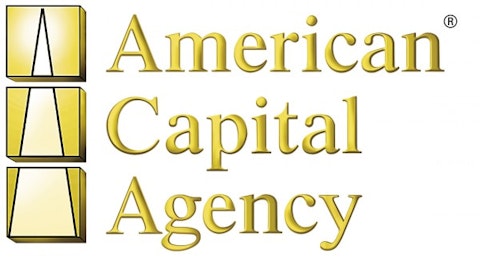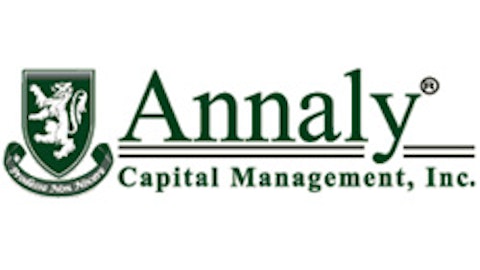In recent years, REITs have gained tremendous favor as stable investments that produce high but predictable yields. Many REITs distribute at least 10 percent of their total NPV on an annual basis, and many have yields that exceed 15 percent. In exchange, REITs generally trade within narrow ranges and rarely participate in equity-market rallies without catalysts specific to the real estate market.
Three firms have caught the attention of observers who play in the REIT space: American Capital Agency Corp. (NASDAQ:AGNC), New York Mortgage Trust, Inc. (NASDAQ:NYMT), and Invesco Mortgage Capital Inc (NYSE:IVR). All three of these companies focus heavily on mortgage-backed securities and eschew physical home purchases. Although this business model lends some stability to their operations, these REITs are vulnerable to sudden changes in the money supply or periods of volatility within the mortgage industry. Investors who wish to gain exposure to the improving housing market and explore potential hedging options for traditional equity positions would do well to take a closer look at these three names.
Comparing American Capital Agency, New York Mortgage Trust and Invesco Mortgage Capital
Since they are structured as REITs, the balance sheets and earnings reports of these three names look starkly different from those of “traditional” companies. With a market capitalization of nearly $10 billion, American Capital Agency Corp. (NASDAQ:AGNC) is by far the largest of the three. New York Mortgage Trust, Inc. (NASDAQ:NYMT) has a valuation of just over $400 million, and Invesco Mortgage Capital Inc (NYSE:IVR) comes in with a capitalization of just under $2.5 billion. Profit margins at all three firms are quite high: Although Invesco Mortgage Capital Inc (NYSE:IVR)’s 89 percent buffer tops the list, New York Mortgage Trust, Inc. (NASDAQ:NYMT) and American Capital Agency Corp. (NASDAQ:AGNC) also post strong respective figures of about 73 percent and 80 percent. Like most mortgage-focused REITs, these names are all highly leveraged. American Capital Agency Corp. (NASDAQ:AGNC) has long-term debt of about $80 billion to offset a cash hoard of $15 billion. Invesco Mortgage Capital Inc (NYSE:IVR) reports total debts of $19 billion and a rather paltry cash reserve of just $280 million. Even the much-smaller New York Mortgage Trust, Inc. (NASDAQ:NYMT) maintains a debt sheet of $6.5 billion and cash reserves of about $254 million.
Common Holdings
All three of these firms maintain portfolios of mortgage-backed securities. It is crucial to note that these portfolios are not uniform. For instance, New York Mortgage Trust, Inc. (NASDAQ:NYMT)’s holdings consist of securities derived from single-family mortgages as well as multi-unit residential, adjustable-rate, interest-only, distressed-market and commercial loans. The other two names are similarly diversified. This serves to insulate these REITs from risks specific to certain sub-sectors of the mortgage industry.
Distribution Ratios
All three of these firms enjoy double-digit payouts. At last count, American Capital Agency Corp. (NASDAQ:AGNC) led the pack with a yield of 18 percent. New York Mortgage Trust, Inc. (NASDAQ:NYMT) was close behind with a payout figure of 15.6 percent, and Invesco Mortgage Capital Inc (NYSE:IVR) offered a solid yield of about 13.4 percent. Under normal circumstances, such yields would be dangerously high. However, these firms are structured to distribute the bulk of their earnings to their shareholders and have the wherewithal to maintain their hefty payouts.
Are They Sustainable?
Many investors and analysts are convinced that high-yield vehicles like these three REITs represent essential hedging tools for everyday investors. Since retail investors and small-time day-traders are not equipped to buy and sell large tranches of mortgage-backed securities and other credit-default swaps on a regular basis, these REITs provide access to those instruments while mitigating the obvious risks associated with them.
Of course, other observers argue that these instruments are inherently unstable and subject to wild fluctuations in market value and distribution ratios. The still-recent memory of the housing collapse and subsequent financial crisis underscores these concerns. Like most derivatives, mortgage-backed securities carry more risk than run-of-the-mill financial instruments like Treasury bonds and certificates of deposit. High yields compensate for some of this risk.
In this regard, these three specific REITs are quite interesting. American Capital Agency Corp. (NASDAQ:AGNC) and New York Mortgage Trust, Inc. (NASDAQ:NYMT) are essentially pure plays on the mortgage-backed security market, and Invesco Mortgage Capital Inc (NYSE:IVR) is heavily invested in the MBS space as well. Accordingly, these REITs’ fortunes are inextricably tied up with the performance of the overall MBS market.
Recently, REITs have seen uneven performance thanks to persistent uncertainty about the state of the Federal Reserve’s quantitative easing program. Experienced market-watchers and amateur bloggers alike have astutely noted that QE has been quite beneficial for the MBS space and other semi-liquid or non-liquid asset classes. Many of these observers fear that the Fed’s long-awaited “tapering” will dry up the supply of money that has flowed into these vehicles. However, it seems unlikely that the Fed will shut off the tap all at once. Moreover, months of steadily improving data now point to a rapidly recovering housing market. Even if the Fed shuts off the spigot towards the end of 2013 or during the early part of 2014, the move might not have the impact that naysayers fear. At the same time, these names are unlikely to appreciate in value at a rapid clip. Investors who seek capital gains rather than steady dividend yields should look elsewhere.
In sum, these three REITs offer some clear advantages. These include high dividend yields, predictable returns and stable business models. However, they also face downside risks in the event of a sudden halt to the Fed’s quantitative easing program or an unexpected pullback in the housing market. Although these names are not suitable for investors who seek organic growth and eschew dividends, they may represent solid opportunities for long-term investors and advanced traders who seek the inherent hedging power of a double-digit yield.
The article MBS REITs Look Good Now, But Can Their Performance Hold Up? originally appeared on Fool.com and is written by Mike Thiessen.
Mike Thiessen has no position in any stocks mentioned. The Motley Fool has no position in any of the stocks mentioned. Mike is a member of The Motley Fool Blog Network — entries represent the personal opinion of the blogger and are not formally edited.
Copyright © 1995 – 2013 The Motley Fool, LLC. All rights reserved. The Motley Fool has a disclosure policy.




